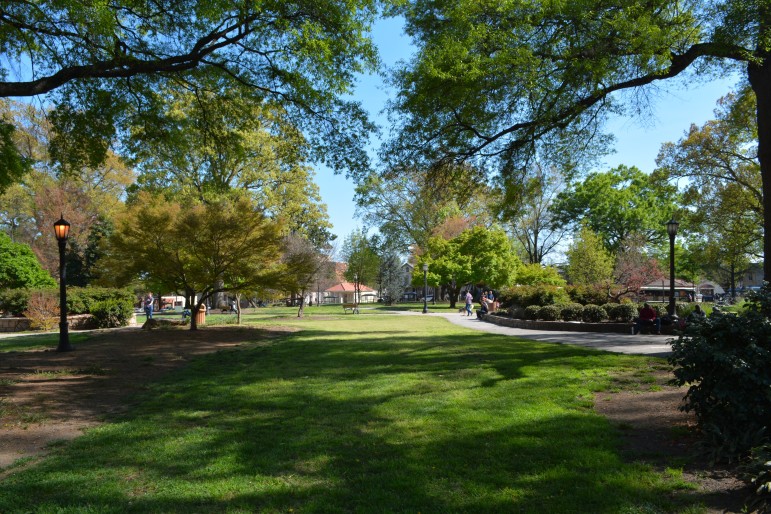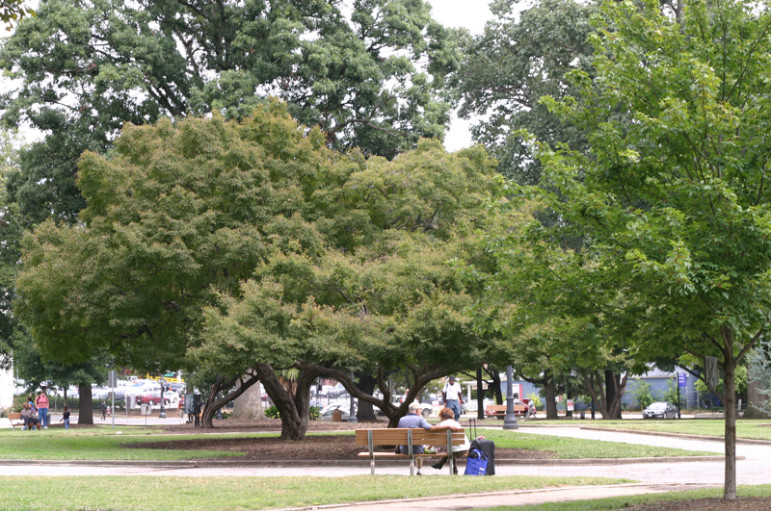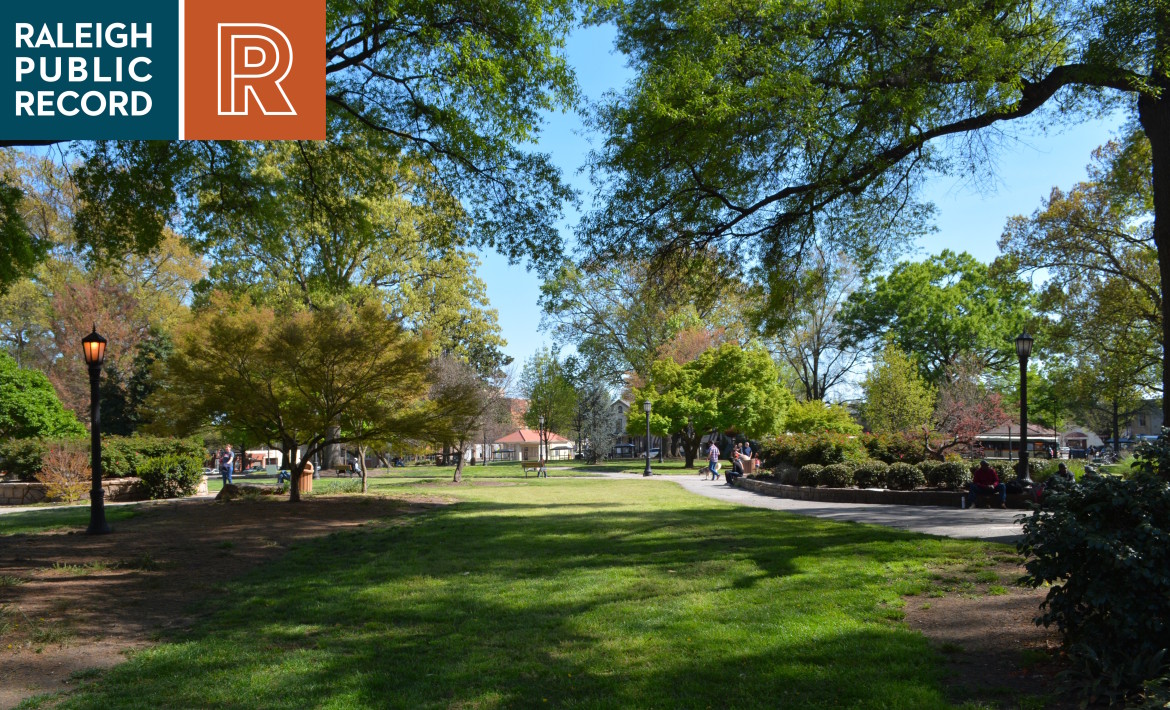The Growth and Natural Resources Committee Wednesday deferred a decision on whether to recommend allowing negotiations to begin with a construction team for the Moore Square redevelopment project.

James Borden / Raleigh Public Record
In February of this year, the City put out a request for proposals for a Construction Manager At Risk to oversee the Moore Square redevelopment project. A CMAR can loosely be defined as a general contractor for a project that guarantees to complete the work at a predetermined price point. The company is “at risk” for any overages outside of owner-initiated change orders.
City staff narrowed down the six proposals it received to a list of the top three firms, all of which were deemed qualified and eligible to handle the project.
Following a series of interviews, it was decided by staff that the most qualified team was a partnership between Whiting Turner and Holt Brothers Construction. The other two firms to make the top three were Barnhill Contracting and Brasfield & Gorrie.
A request to begin negotiations with Whiting Turner/Holt Brothers was included in the Council’s consent agenda for the April 19 meeting. The consent agenda is a set of routine items that can be approved by a roll-call vote at the beginning of a meeting, although this item was pulled at the request of Mayor Nancy McFarlane and Councilor Kay Crowder. Councilor Mary-Ann Baldwin, VP of marketing and development at Holt Brothers, was not present at the April 19 meeting.
McFarlane expressed concerns that staff had not included in its packet to Council any information about the specific proposals received.
“I’m curious about the other two firms: nothing tells us what the difference is, nothing speaks to how things were scored,” she said.
Council voted to send the item to the Growth and Natural Resources Committee for further discussion and analysis. The Committee is chaired by Councilor Crowder and includes Councilors Russ Stephenson, Bonner Gaylord and Dickie Thompson.
Why CMAR?
Crowder began Wednesday’s meeting by asking staff to explain why they’d chosen to go with a CMAR process for this project, instead of having an open bid process where the lowest qualified bidder is awarded.
“It gave us the chance to find a contractor qualified for the project, there were quite a few sensitivities: the number one priority was the protection of the trees,” responded interim Public Works director Richard Kelly.
“This gives us the ability to look at the qualifications vs. looking for the lowest bidder, we’re able to find a contractor that has the experience.”
Kelly added that staff had informed Council of its decision to pursue a CMAR process back in January of this year.
Gaylord later acknowledged this, noting, “We should have given you feedback on this in January, in respect to a CMAR, there’s construction and architecture and design experts up here so it’s not entirely fair” that the issue was just now being discussed, he said.
Councilor Thompson, an executive vice-president at general contracting firm JM Thompson said he wasn’t sure Moore Square was a large enough project that it necessitated a CMAR.
“We’re all concerned about being stewards of the taxpayer’s money, and we want to make sure we’re spending it wisely,” Thompson said.
Thompson added that a CMAR contract is usually more expensive than one for a general contractor due to the assumed risk.
“We do know that a CMAR contract is very appropriate for certain types of projects, but usually at a higher dollar level than what we’re seeing here today,” he said.
Crowder agreed.
“I think it’s important for us as a city to not get into the habit of assuming every project we do, no matter how small, linear or complicated in scope, has to have a CMAR,” she said.
“On a Union Station, it makes absolute sense, it’s a little more difficult for me on this case to quite understand.”
“I do say again that we’re adding costs to this project, and it’s not our money, it’s taxpayer dollars.”
Kelly agreed, saying they wouldn’t have gone the CMAR route had they not felt “very strongly” that there was added value in doing so.
“As far as the CMAR process goes, in this particular instance, it’s a unique situation we think works for this project delivery method.”

John Wall
The Arborist Advantage
When recommending Whiting Turner/Holt Brothers for the job, staff had singled out two characteristics that helped set them apart: an arborist had been incorporated into the team, and they had outlined a particularly effective communications strategy with neighbors who would be affected by the construction.
Neither of these items were specifically requested in the proposal.
“I’d have had a reaction of, I wish I’d known that was valuable, since we didn’t have established criteria,” Gaylord said of staff’s choice to let these items influence their final decision.
Kelly said when narrowing down the six proposals, they hadn’t considered any criteria outside of what was spelled out in the initial Request for Qualifications. By the time the final three had been selected and the interview process began, he said, all the finalists were on equal footing.
“It was influential that [Whiting Turner/Holt Brothers] took the initiative to bring an arborist to the interview and the other two did not,” Kelly explained.
Thompson raised additional concerns as to whether it was even the role of a CMAR to communicate with surrounding residents and businesses about a project’s potential impact, saying that was a role best left to the City.
Kelly said this type of communication would ultimately be the responsibility of the City, but that they had appreciated the plan Whiting Turner/Holt Brothers had laid out for reaching out to the neighborhood regarding changes both foreseen and unexpected.
After discussing the issue for nearly an hour, the Committee remained unsatisfied with why staff had chosen a CMAR for the project, and voted to continue the discussion to its next meeting on May 11.
